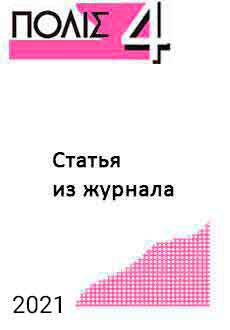Online shop of "Polis. Political Studies" Journal
We in the world, the world in us
Pomiguev I.A., Alekseev D.V. Resetting Bills: Discontinuity as a Political Technology for Blocking Policy Decision. – Polis. Political Studies. 2021. No. 4. P. 176-191. (In Russ.).
150 руб.
veto players, veto technologies, veto actors, legislative process, principle of discontinuity, resetting bills, legislative activity, system of checks and balances.
The article deals with discontinuity procedure as a political technology used to reject legislative initiatives in case a Parliament has not adopted a public political decision in a scheduled time. Complementary veto players theory by George Tsebelis is used in this article. In particular, the authors set out to study not only institutional and partisan veto players, but also the other participants in the legislative process: veto actors (in other words, “gatekeepers”). The authors create a concept of “veto-technologies”, enabling the expansion of the analytical potential of the theory through studying specific initiative-blocking technologies such as discontinuity. In this article, we review studies on the discontinuity of political science, the features of its influence on the parliamentary agenda, and the timing of legislative initiatives. During the study on the use of discontinuity in fourteen countries, the authors identified universal procedural characteristics that determine the configuration and significance of this technology in the legislative process: the effective period (session, convocation, calendar year); the conditions under which discontinuity is not applied; the document that consolidates the discontinuing procedure. The authors also offer an analysis of this theory’s application in the Russian Empire. The possibilities of applying discontinuity in modern Russia are considered in three dimensions in which the Government works with the State Duma: institutional, partisan, and positional. In the meantime, the procedure can be established through the amendments to the Regulations of the lower house. This obviates the need to coordinate such a decision with other institutional veto players. Discontinuity in perspective can help eliminate the political risks of making unpopular domestic and foreign policy decisions and, as a result, strengthen Parliament’s position in relations with the other public authorities. Adverse effects of the introduction of discontinuity may be the further development of non-public and informal procedures to negotiate the positions of stakeholders, as well as a decrease in the political weight of ordinary deputies in comparison with veto-actors setting the parliamentary agenda.
 English
English Русский
Русский

Reviews
There are no reviews yet.